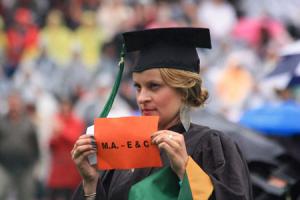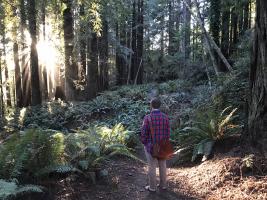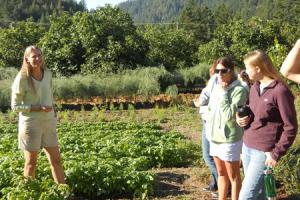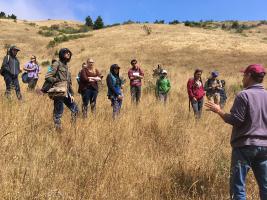Fall 2015
Fall 2015
Unless otherwise noted, events are 5:30pm-7:00pm Thursdays in Gist Hall 218 *
September 3
Matthew Marshall
“RePowering Humboldt: Progress Toward Implementing A Local Community Choice Aggregation Program”
Matthew Marshall is the Executive Director of the Redwood Coast Energy Authority (RCEA). Under the delegated authority of the Energy Authority Board of Directors, Mr. Marshall manages all RCEA activities and functions; guides and implements strategic planning; and oversees program development, implementation, and evaluation. Mr. Marshall has been involved in a variety of energy planning, policy, and implementation endeavors, and previously served as the Greenhouse Gas Reduction Program Administrator for the City and County of Denver, where he was responsible for developing and managing locally-, state-, and federally-funded comprehensive greenhouse gas reduction projects and community partnerships in support of Denver’s Climate Action Plan. A graduate of Cal Poly Humboldt, Mr. Marshall’s work on innovative sustainable energy systems and programs has been recognized and honored by the National Hydrogen Association, the U.S. Department of Energy, the California Hydrogen Business Council, the American Lung Association in Colorado, and the United States Congress.
Mr. Marshall’s volunteer non-profit service includes serving on the Board of Directors of the Trinidad Coastal Land Trust (President), the Northcoast Educational Foundation (President), the Humboldt Folklife Society (President), the Center for Environmental Economic Development, and the Trinidad Museum Society; he is also a firefighter with the Westhaven Volunteer Fire Department and a professional artist and bagpiper.
September 24
Seth Shonkoff
“The Environmental, Public Health, and Climate Dimensions of Oil and Gas Development in California”
Dr. Shonkoff is the executive director of the energy science and policy institute, PSE Healthy Energy. He is also a visiting scholar in the Department of Environmental Science, Policy, and Management at University of California, Berkeley, and an affiliate in the Environmental Energy Technologies Division at Lawrence Berkeley National Laboratory in Berkeley, California.
An environmental and public health scientist by training, Shonkoff has more than 15 years of experience in water, air, climate, and population health research. Shonkoff completed his PhD in the Department of Environmental Science, Policy, and Management and his MPH in epidemiology in the School of Public Health from the University of California, Berkeley. He is a contributing author to the human health chapter of The Intergovernmental Panel on Climate Change (IPCC) Fifth Assessment Report (AR5). He was also the lead author of the two human health chapters in the California Senate Bill 4 Independent Scientific Study on hydraulic fracturing and well stimulation, published in July 2015. He has worked and published on topics related to the intersection of energy, air pollution, water quality, climate, and human health from scientific and policy perspectives. Shonkoff’s current work focuses on the human health, environmental, and climate dimensions of oil and gas development in the United States and abroad.
October 8
Jack West
“The PV Industry: An Insider’s Insights into the Evolution of PV Technology and Business Models”
Jack West is a recognized expert and key technology leader in the photovoltaics industry and a regular speaker/lecturer on PV technology. An avid inventor, Mr. West is the holder of dozens of patents in the solar and music industries.
West graduated magna cum laude from Cal Poly Humboldt (Humboldt) in 1991, with a BS degree in Appropriate Technology Engineering, Solar Engineering Focus. During his tenure as co-director of Humboldt’s Campus Center for Appropriate Technology, West was inspired by the vision of a fossil-fuel-free world. That vision led him to dedicate himself to the PV industry for the past 25 years. He began his career in the early 1990’s by creating one of the first grid-tied PV installation businesses in California. In 2000, he cofounded High Sun Engineering, the first California-based engineering firm specializing in PV system design and engineering. In 2009, he cofounded Zep Solar to commercialize his rail-free PV mounting invention. West is also the creator of Zep Solar’s unique business model based on standardization of the Zep Compatible™ platform.
October 22
Charles Wilkinson
“From Humboldt Bay to the Columbia to the Canadian Line: How the Northwest Tribes Triumphed in the Courts and Changed the World”
Watch Full Presentation
Charles Wilkinson has written broadly on law, history, and society in the American West and has placed a major emphasis on American Indians. His 14 books include the standard law texts on federal public land law and Indian law and several books for a general audience such as The Eagle Bird (Pantheon 1992), Crossing the Next Meridian (Island 1992), Fire on the Plateau (Island 1999), Messages from Frank’s Landing: A Story of Salmon, Treaties, and the Indian Way (U. Washington 2000), Blood Struggle—The Rise of Modern Indian Nations (W.W. Norton, 2005), and The People Are Dancing Again: The History of the Siletz Tribe of Western Oregon (U. Washington 2010). Over the years he has worked closely with many tribes. He served as counsel for tribes concerning passage of Menominee Restoration Act of 1973, the Siletz Restoration Act of 1977, and the Siletz Reservation Act of 1980. He has also taken on many special assignments for the federal Departments of Interior, Agriculture, and Justice; and states, cities, and Indian tribes. For example, in 2010, he acted as facilitator in negotiations reaching a comprehensive agreement between the Olympic National Park and the eight Olympic Peninsula tribes concerning tribal resource rights in the Park. In 2013 the Warm Springs Tribal Museum of Oregon honored him with its Twanat Award for “his tireless work on behalf of Native Americans.”
*This event will be held in University Center 225 – Kate Buchanan Room.
November 5
Harsha Walia
“Border Imperialism and Environmental Racism”
Watch Full Presentation
Harsha Walia is an author and activist who is formally trained in the law. She immigrated from India and currently resides in Vancouver, on the lands of the Indigenous Coast Salish people.
Harsha has been named one of the most influential South Asians in British Columbia by the Vancouver Sun and one of the ten most popular left-wing journalists by the Georgia Straight in 2010. Naomi Klein has called Harsha “one of Canada’s most brilliant and effective political organizers.”
Harsha’s book, Undoing Border Imperialism, was published in 2013 by AK Press. Her writings have appeared in numerous magazines, including Briarpatch, Canadian Dimension, Dominion, Feministing, Fuze, Left Turn, Mondoweiss, People of Color Organize, Rabble, Racilicious, Sanhati, Z Magazine, and others. She has contributed essays to academic journals as well as chapters in the anthologies Power of Youth: Youth and community-led activism in Canada; Racism and Borders: Representation, Repression, Resistance; Beyond Walls and Cages; Stay Solid; Broken Trouble: A Toolbox for Revolution; Organize! Building from the Local for Global Justice, and the Winter We Danced.
Harsha is a cofounder of the migrant justice group No One Is Illegal and the progressive South Asian network Radical Desis. She is an organizer in numerous social justice organizations, and has made a number of presentations to the United Nations on social and economic justice issues.
November 12
Sarah Ray
“Can a Green University Serve Underrepresented Students?: Reconciling Sustainability and Diversity at Humboldt”
Watch Full Presentation
Sarah Jaquette Ray is Assistant Professor of Environmental Studies at Cal Poly Humboldt (Humboldt), where she also leads the Environmental Studies Program. She began at Humboldt in 2013, after four years leading the Geography and Environmental Studies program at University of Alaska Southeast. She received her PhD from University of Oregon in 2009 in Environmental Sciences, Studies, and Policy, with English as a focal department.
Ray’s research interests are environmental justice, identity and the cultural politics of nature, environmental humanities, ecocriticism, and critical human geography. Her book, The Ecological Other: Environmental Exclusion in American Culture (Arizona, 2013), explores the roots of environmentalism’s inability to be welcoming to a wide variety of communities in the U.S., focusing on how these roots manifest in contemporary exclusions of immigrants, Native Americans, and people with disabilities.
In this talk, Ray will bring these analyses to bear on the context of Humboldt’s twin values of “sustainability” and “diversity.” Ray will contend that achieving these goals will require reckoning with the broader historical tensions between environmentalism and social justice.






